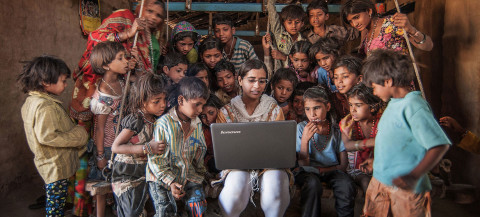“Far from distracting us from the urgency of digital cooperation, COVID-19 is making it more important than ever, and demonstrating the interconnected nature of the challenges we face”, Secretary-General António Guterres informed Thursday’s “High-level Thematic Debate on the Impact of Rapid Technological Change on the Sustainable Development Goals (SDGs) and Targets”, taking place in the UN General Assembly.
We cannot reap the full benefits of the digital age without the global cooperation needed to reduce its potential harms.
The Roadmap for Digital Cooperation has concrete actions to connect, respect and protect people in the digital age. https://t.co/ms1qoZmYvv pic.twitter.com/84iaeqXQpJ
— António Guterres (@antonioguterres) June 11, 2020
Noting that digital technology is central to almost every aspect of effective pandemic response – including vaccine research, online learning models, e-commerce, and work-from-home tools – he pointed out that the digital divide between those on and offline, is threatening to become “the new face of inequality”, reinforcing the social and economic disadvantages suffered by women and girls, people with disabilities and “minorities of all kinds”.
Post-COVID roadmap
Mr. Guterres told the meeting that we are only beginning to understand the social implications of a post-COVID world.
“But one thing is certain”, he stated, “as we recover and rebuild, digital technology will be more prominent and important than ever”.
The UN chief maintained that those without access will be left further behind and referenced a 2018 report of the High-level Panel on Digital Cooperation concerning the optimization of technology, while mitigating its potential downsides.
He announced that its recommendations to close the digital divide, including growing human and institutional capacity for today’s digital age; upholding human rights in digital contexts; building cyber trust and security; and agreeing on a new global architecture for digital cooperation; were all a part of the UN’s Roadmap for Digital Cooperation, which was also launched on Thursday.
“We cannot reap the full benefits of the digital age without mobilizing global cooperation to close digital gaps and reduce potential harms”, upheld the Secretary-General.
Stressing the urgent need for “global vision and leadership”, Mr. Guterres said that the roadmap calls on everyone to take concrete action together to “connect, respect and protect people in the digital age”.
“Future generations will judge whether we seize the opportunities of this unprecedented moment”, he concluded.
SDGs hang in balance
Opening the General Assembly meeting, President of the world body, Tijjani Muhammad-Bande, acknowledged that the COVID-19 pandemic has forced everyone to “change the way we work, teach and learn; even the way we mourn and heal”.
According to Mr. Muhammad-Bande, the digital divide is not only about how inequalities to access exist, but also about how rapid technological change may actually widen those disparities.
“Educational opportunities may be lost by lack of awareness and high cost of connectivity”, he elaborated, adding that digital literacy, “already a defining feature of this century”, will determine how societies deal with future challenges, from human rights to the climate crisis (SDG13) – encompassing a sweeping range of SDGs.
The Assembly president said, “the need to eradicate poverty [SDG1], end hunger [SDG2] and achieve quality education for all [SDG4] is more urgent than ever.”
Against this backdrop, he maintained that it is the responsibility of the international community to make sure that “rapid technological changes, including their economic, social and ethical impacts, are taken into account and responded to”.
Women too
The Assembly President also underscored the need to step up the pace to remove barriers to women’s and girl’s full participation in the digital world (SDG5), reiterating that “limited access to quality education, and affordability, as well as cultural norms, still prevent many from entering such fields”.
And pointing out that 2020 marks the beginning of the Decade of Action and Delivery on the SDGs, he said, “we must be mindful not to lose sight of the commitments we have made to achieve the 2030 Agenda for Sustainable Development”.
“We must make sure that we harness the promise of emerging technologies towards accelerating the achievement of the SDGs”, concluded the Assembly chief.
URL:


